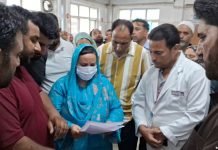
SRINAGAR — With the new evidence revealing that COVID-19 spreads through air, Doctors Association Kashmir (DAK) on Tuesday called for urgent change of safety norms.
“We need to focus on measures that would prevent airborne transmission of the virus which is now considered to be the primary route of spread,” said DAK President and influenza expert, Dr Nisar ul Hassan.
“Improving indoor ventilation would help tackle airborne transmission,” he said, adding, “Opening windows for proper ventilation could be a significant measure at controlling the spread of COVID-19.”
“The simple measure plays a critical role in removing contaminated air and protecting people,” DAK President said.
“In mechanically ventilated buildings, ventilation is typically provided by heating, ventilation and air conditioning (HVAC) systems,” he added.
“Upgrading ventilation systems to improve ventilation rates and eliminate air-recirculation would help reduce the risk of airborne infection,” he said, adding, “People are much more likely to become infected in poorly ventilated spaces.”
“The use of sufficient and effective ventilation in public buildings including hospitals, shops, offices, restaurants, elevators, schools, conference rooms or public transport would be a critical measure to reduce the likelihood of virus transmission and thereby protect healthcare workers, patients and general public,” he said.
“Last week, a study published in Lancet revealed that indoor airborne transmission associated with small aerosol droplets play a dominant role in the spread of COVID-19,” he said, adding, “Till now, large droplet transmission was considered to be the main mode of transmission, and emphasis was laid on staying two-meter apart from the next person, cleaning surfaces and wearing gloves.”
“But in aerosol transmission, particles can travel for long distance of 20-30 feet and can remain suspended in air for hours,” he said, adding, “So if an infected person coughs and sneezes in a closed space, the virus may be present in the air even after he is gone, emphasizing the importance of ventilation.”
He said, “Another crucial implication of airborne spread is that the quality of the mask matters for effective protection against inhaled aerosols. Masks usually impede large droplets from landing on covered areas, and most are at least partially effective against inhalation of aerosols.”
“However, both high filtration efficiency and a good fit are needed to enhance protection against aerosols because tiny airborne particles can find their way around any gap between mask and face,” said Dr Nisar.
Follow Us
The Kashmir Pulse is now on Google News. Subscribe our Telegram channel and Follow our WhatsApp channel for timely news updates!










